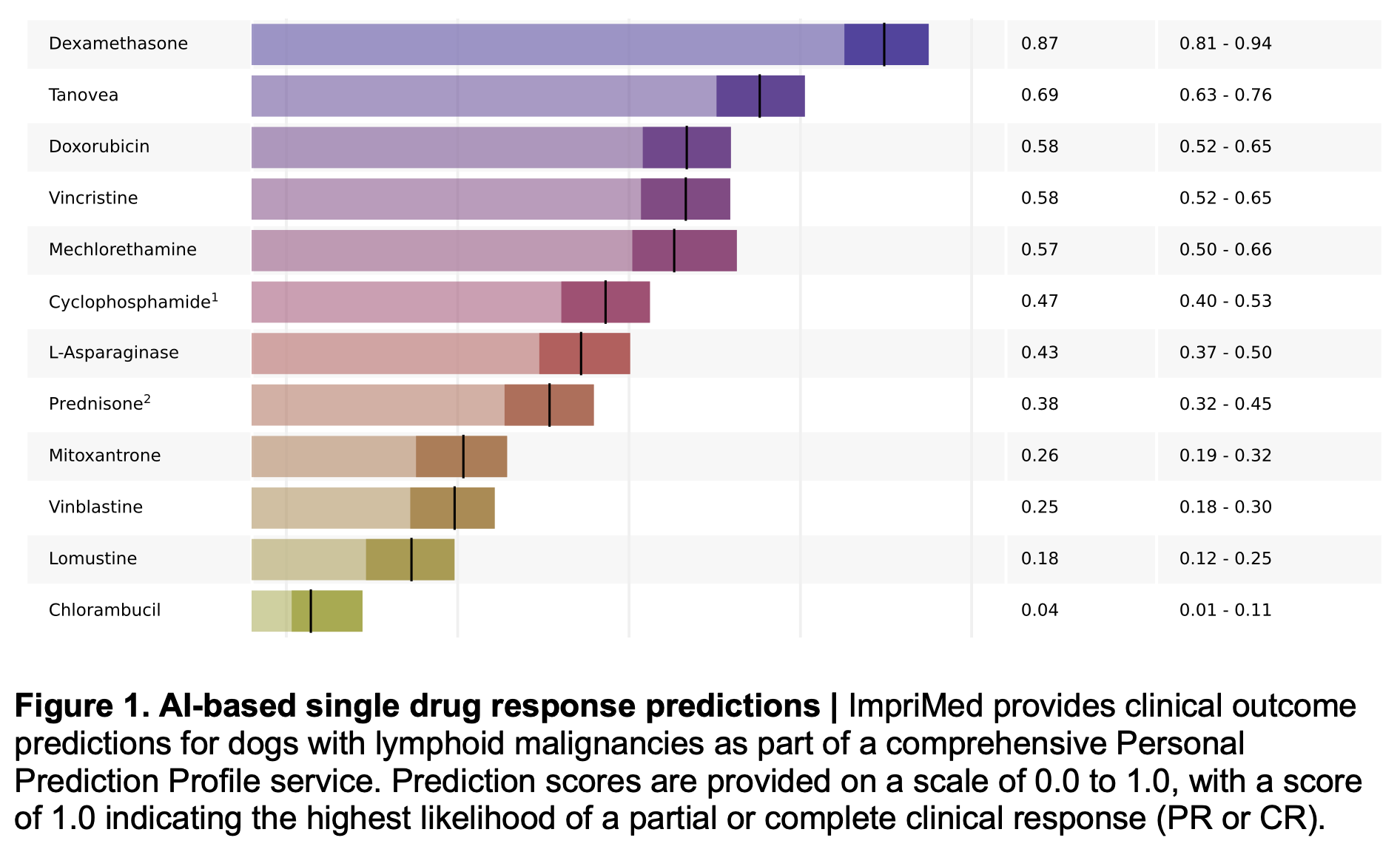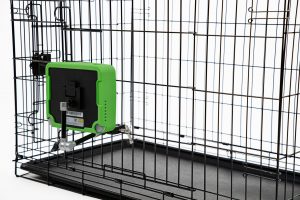The ImpriMed Personalized Prediction Profile for dogs with lymphoid malignancies provides clinical outcome predictions for different chemotherapy treatment options (Fig. 1)1,2. Predictions for individual drug responses are generated by AI algorithms that integrate data from ex vivo drug sensitivity testing and flow cytometry assays. Oncologists use the report, along with their clinical expertise, to develop a treatment plan with their clients. To quantify the clinical impacts of the AI report in veterinary oncology practices throughout the US, clinical outcomes data were collected and analyzed using a matching score statistic commonly employed in human precision oncology clinical trials3–8. Patients were divided into two groups: a high matching score group with a high degree of matching between recommended and administered drugs, and a low matching score control group. Results are summarized here for two cancer types that are frequently encountered in clinical practices and that can be difficult to drive into durable remission: relapsed B-cell lymphoma and high-grade T-cell lymphoma.
IMPRIMED AI FOR DOGS WITH RELAPSED B-CELL LYMPHOMAS

CHOP combination therapy is an effective standard of care for first-line treatment of dogs with B-cell lymphoma, but there is no standard of care after relapse occurs. To determine if ImpriMed’s AI predictions have helped clinicians select effective chemotherapy treatments for dogs with relapsed B-cell lymphomas, we analyzed outcomes for 60 dogs treated by oncologists who received ImpriMed’s AI prediction reports. The dogs were divided into high matching and low matching groups to assess the clinical performance of the predictions. Remarkably, dogs in the high matching group experienced better outcomes by every metric analyzed (overall response rate, complete response rate, survival times, and durations of complete responses) when compared to either the low matching group or when compared to historical control values9,10 (Fig 2, Table 1).
Complete response rate and median duration of complete response were 4-fold higher in the high matching group relative to the low matching group (Fig. 2a), and median survival time was more than 3-fold longer (Table 1: 270 days high, 83 days low). Differences in the CRR and survival times were highly significant, with p-values of 0.002 and <0.001 respectively (Fig. 2a, b).


In a multivariate Cox proportional hazards model, the degree of matching between AI prediction and treatments was more predictive of patient survival than either tumor grade or stage (Fig. 3).
The remarkable clinical outcome advantage of a high degree of matching between AI predictions and treatments relative to low matching controls was also seen when clinical outcomes were compared to historical controls (Table 1). For instance, CRR in the high matching group (53%) was higher than the historical control value (27%) and median duration of complete response (200 days) was almost twice as long as the historical control value (106 days).
This analysis of prospective clinical outcomes strongly supports the efficacy of using ImpriMed’s AI-based decision support to select effective drugs for dogs with relapsed B-cell lymphomas and opens the door to improved outcomes for patients with other cancers that have evolve in complex ways in response to prior therapies.
IMPRIMED AI FOR DOGS WITH HIGH-GRADE T-CELL LYMPHOMAS

Standard of care for dogs with T-cell lymphomas is not as well defined as for B-cell lymphoma because the cancer subtype occurs less frequently (~30% of lymphomas). To measure the impact of ImpriMed’s AI prediction report on treatment outcomes for patients with high-grade T-cell lymphoma, outcomes were analyzed for 66 dogs that were treated by oncologists who received the report. Similar to the results for dogs with relapsed B-cell lymphoma, the dogs who received treatment with a high degree of matching between their AI predictions and subsequent drug administrations experienced remarkably better clinical outcomes (Fig. 4). CRR was dramatically greater in the high matching group (Fig. 4a, 59% high, 9% low, p = 0.006) and patient survival times were significantly longer (Fig 4b, p = 0.004).These results support the efficacy of using ImpriMed’s AI prediction to help select drugs for dogs with high-grade T-cell lymphoma and raises the exciting possibility that this AI may help to effectively target other cancers with relatively rare immunophenotypes.
Source : https://www.imprimedicine.com/updates/imprimed-ai-for-dogs-with-relapsed-lymphomas






